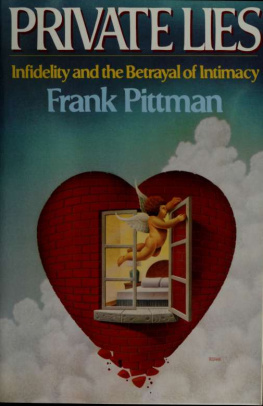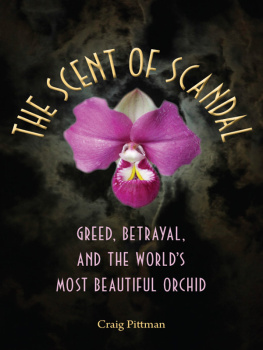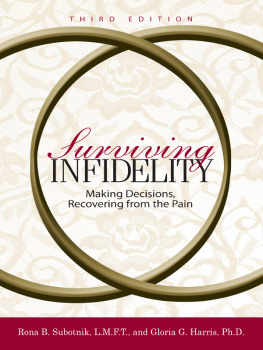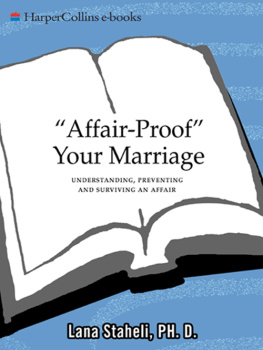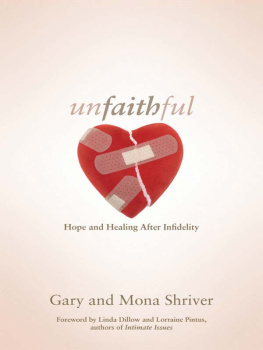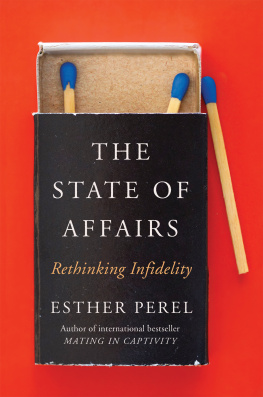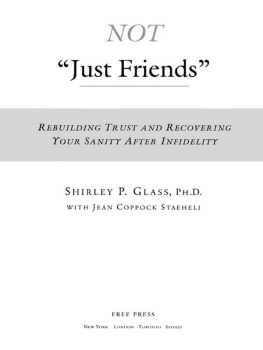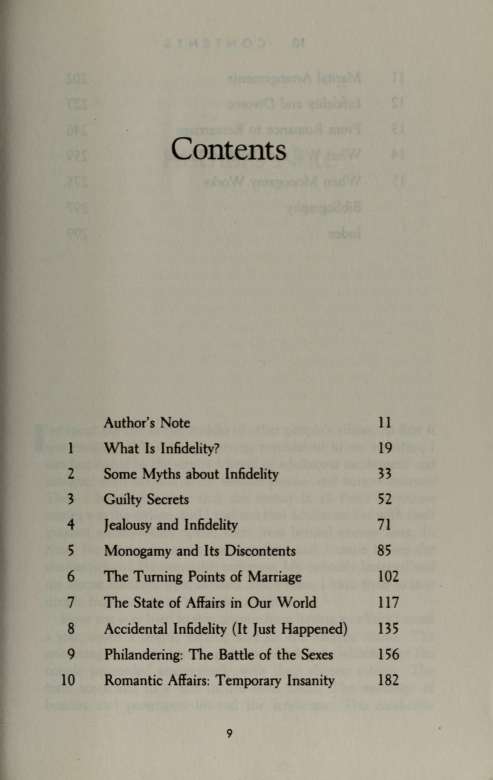This book made available by the Internet Archive.
To Betsy, with all my love
Authors Note
i
Ve spent my life in the middle of other people's affairs. At first it was exciting. When I was a young psychiatrist in my twenties, I was fascinated by the stories I heard of adulterous excitement and intrigue, even envious of the intense passion and narrow escapes. Then I began to notice that the enemy in all these adventure stories was the spouse, and I realized that adulterers live with their greatest enemythey spend their lives behind enemy lines. In time, the stories began to run together, and I came to see the similarities and the inevitable outcome. My curiosity lessened and my rescue fantasies were aroused. Since then, I have tried to stop people from risking so much for so little.
Have you ever tried to stop anyone from having an affair? I recall a joke about a couple making love on the railroad tracks. The oncoming train was barreling down, blowing its whistle, but the couple proceeded energetically with their chosen activity. The train screeched to a halt inches from them. The wreckage of boxcars and passengers littered the landscape. The conductor
12 AUTHOR'S NOTE
looked down at the now spent couple and demanded, "Why the hell didn't you move?" The relaxed man grinned. "You was coming and I was coming, and you were the only one with brakes."
My family, like all families, I suppose, had its mythology about infidelity. According to family legend, a great-uncle by marriage had a scandalous relationship with his secretary in 1907, an affair that greatly affected his life, and ultimately mine. Great-Uncle Jos had married my great-aunt Ora and had become treasurer of the family cotton mills in Griffin, Georgia. He took a liking to his secretary, whom I'll call Cat Cole, and "wore the office wall thin with her." To cover some Christmas gifts to Cat Cole, he embezzled a little money, faked the books, and gambled in cotton futures to recover his losses. Good money was thrown after bad, there was a crisis of confidence with the stockholders, and Great-Uncle Jos went to trial for larceny after trust, and then to prison. Great-Aunt Ora waited for him, and took him back. We have no idea what became of Cat Cole, as she left Griffin to seek her fortune elsewhere. The cotton mills failed. My grandfathera lawyer, judge, senator, writerwas not a businessman, yet he inherited the problems. He fell sick, took to drink, and died soon afterward.
My grandmother, who told me this story so many times, was left with two small daughters, all the debts, and the newspaper my grandfather had bought so he could have a place to publish his poetry. She moved in with relatives, edited the paper, and struggled to pay off all those debts. My grandmother had little tolerance for her brother-in-law Jos' behavior, and some doubts about Ora's wisdom in taking back the prodigal husband. Grandmother was sure she would not have taken him back.
I never met my great-uncle Josmy grandmother wanted nothing to do with a person of such weak character. "If he would lie to his own wife, he'd lie to anybody," she said. "How could his stockholders be so naive as to believe he'd be honest to them?"
I don't believe my grandmother quite understood that Great-Uncle Jos and Cat Cole might not have been the only adulterous couple in Griffin, Georgia, at Christmastime of 1907. When she had her strokeshortly after her eightieth birthday party and just before my weddingit was i960, and by then Kinsey had pub
lished his report on the sexual behavior of human males. My grandmother refused to acknowledge it. She made it a point to read only British mysteries written by Agatha Christie or other well-born women. Murder was an acceptable topic for polite examination; adultery was not. Her newspaper, like most respectable papers, chose to ignore news of sexual indiscretion. Her belief was actually the prevailing belief of the time, the prevailing belief until quite recently. "It is best not to know people's secrets. People must have a good reason for keeping their secrets secret. If you knew people's secrets, you might have to think about them, and that would be distracting. It is just best not to know."
Had Grandmother not already had her stroke, it would certainly have been brought on by my announcement that I had chosen psychiatry as my life's career. She had heard enough of Freud to know that she wanted nothing to do with a man who would devote himself to uncovering other people's secrets. And she would have approved my mother's (her daughter's) warning about my own psychoanalysis"If you discover you have an Oedipus complex, I want you to know that it comes from your father's side of the family, not mine."
I certainly wouldn't want society to go in the direction my grandmother took, of declaring adulterous people beyond the pale and refusing to receive them socially. (They may be the majority anyway.) We won't go back to the times when adulterers were put in the stocks and publicly humiliated, or become one of those societiesand there are manyin which adultery is punishable by death. Society in any case is unable to enforce a rule that the majority of people break, and infidelity is so common it is no longer deviant. But that doesn't stop it from being problematic.
I wrestle with infidelity and its aftermath every day in my office. Now, though my grandmother would find it unseemly, I would like to bring it out into the open and take a look at the secrets around which so many people center their existence. Why, we must ask, would otherwise sane peoplepeople who buy insurance, who stop for traffic lights, who brush after every mealrisk everything in their lives for a furtive moment of sex?
That is the crucial question this book attempts to answer. As I
14 AUTHOR'S NOTE
write this, I find myself saying to you what I keep saying on the subject to my patients, my friends, my kids, my professional colleagues. I try to define for you the nature of infidelity, particularly the fact that the infidelity is not so much in the sex but in the dishonesty and secrecy of the act. I ask you to look with me at the popular mythology of infidelity, and attempt to strip away the mistaken notions about it. I explore with you the helpfulness of two much unappreciated emotionsguilt and jealousyboth of which, in small enough doses, are necessary for honesty and intimacy. I examine the brittle institution of marriage, the reasons why some people find it difficult, and the turning points in the course of a lifetime when people find it most fragile. I reveal what I find in the affairs that come into my office.
I then describe four patterns of infidelity, and the crises that develop in the course of each pattern. I explain to you my thoughts about how affairs lead to divorce (and how to keep that from happening), and why affairs are a shaky basis for remarriage (and how, if you must go ahead with such a star-crossed marriage, to increase the chances of it working). I look with you at the damage done to the children in these marriages, with some thoughts about how to reduce the sacrifices they must make for their parents' infidelities. Finally, I offer you my best advice on what people should do if they find themselves in a relationship or in a marriage in which there is or has been an infidelity, and tell you what I've learned about making monogamy work.

